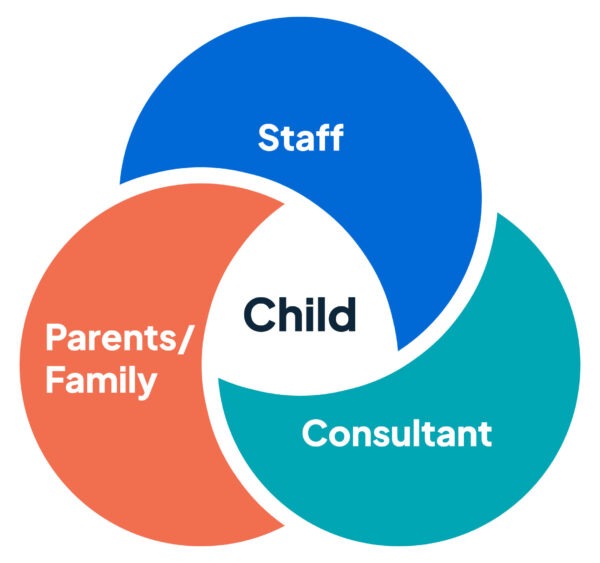Empowering Human Potential of Adults and Children
Within every human being lies potential ready to be expressed. One way we create environments that support teachers and the young children and families they serve is to realize their unique potential is through early childhood mental health consultation (ECMHC). Recognizing the adults in the child’s daily life are their most powerful influence, we place specially trained mental health consultants at our centers to support the teaching teams and families. The consultants work with these adults to create and sustain environments, interactions and experiences that promote positive mental health, buffer the effects of toxic stress and trauma, and bring out the most optimal development and learning of each unique child in their care.

Enhancing ECE Workforce’s Care for the Most Vulnerable Children and Families
The children and families that we serve bring incredible strengths, resources and capabilities that drive their hopes and efforts toward success and well-being. Unfortunately, our children and families also come experiencing many stressors and adverse experiences. ECMHC helps our teaching teams with having the knowledge, understanding, resources and skills to recognize, respond and meet the needs presented by children and their families affected by toxic stress and other traumatic events.
Supports the Well-Being of the Adult Caregivers
The mental health and well-being of children are intricately linked to the well-being of their adult caregivers. Teachers and parents can be affected by significant stress, trauma, and adversity while still carrying on in their role as caretaker to others. ECMHC creates a space and opportunity for the teaching teams and parents to gain support for their own personal mental health, self-care and receive assistance with the stressors and difficulties associated with the ongoing caregiving and teaching of young children especially those showing emotional, behavioral and developmental difficulties, or other individual differences. Through this support, they are better able to maintain their own well-being and provide the highest quality of care.
Promotes Powerful Outcomes that have Lasting Impact
Consultation works. Results include:
- Enhancement of all relationships involved in the care setting creating a powerfully safe web of adults available to support children
- Increased recognition and an effectiveness in response to the effects of toxic stress and adversity upon adults and children bringing forth healing and resilience
- Reduced overall work-related stress for ECE staff as well as turnover, burnout, compassion fatigue and vicarious trauma by offering emotional support to the teaching staff to address the impact of the work on them
- Strengthened staff confidence and competence in dealing with troubling or difficult behaviors of young children in their care
- Reduction in rate of expulsion of children and families from programs due to home/school conflict and challenging behaviors of children
- Improvement in classroom climate resulting in more positive interactions between teachers and children and well as between teachers and families, as well as fewer negative exchanges
The accumulation of these benefits results in the improved overall quality of early care and education settings. The most significant impact of early childhood mental health consultation is the deeper and stronger capacities cultivated in each staff person will touch not only the lives in their current care but also all the children and families they will touch in the teaching career here at Kidango and beyond.
Our Approach
Early childhood mental health consultation (ECMHC) is an evidence-based practice with three defining features:
- Ongoing, weekly conversations and dialogue involving the teaching teams and their consultant
- Interactive process drawing upon differing perspectives, strengths and resources to problem solve
- Adult focus aimed to build the capacity of staff, programs, and families
Our framework uses six powerful lenses as the core of the consultative approach. These lenses include: culture and diversity; bias, equity and power; development and neuroscience; attachment; trauma; and relational engagement. These lenses offer a holistic and comprehensive way of understanding and addressing the complex, unique factors that influence the realization of human potential and growth. ECMHC aims to help the teaching teams draw upon these lenses to support their practices and interactions with children and families.
Greater health for a greater future
For our children, our families, and our communities.
Estimate based on data supplied by CDE






